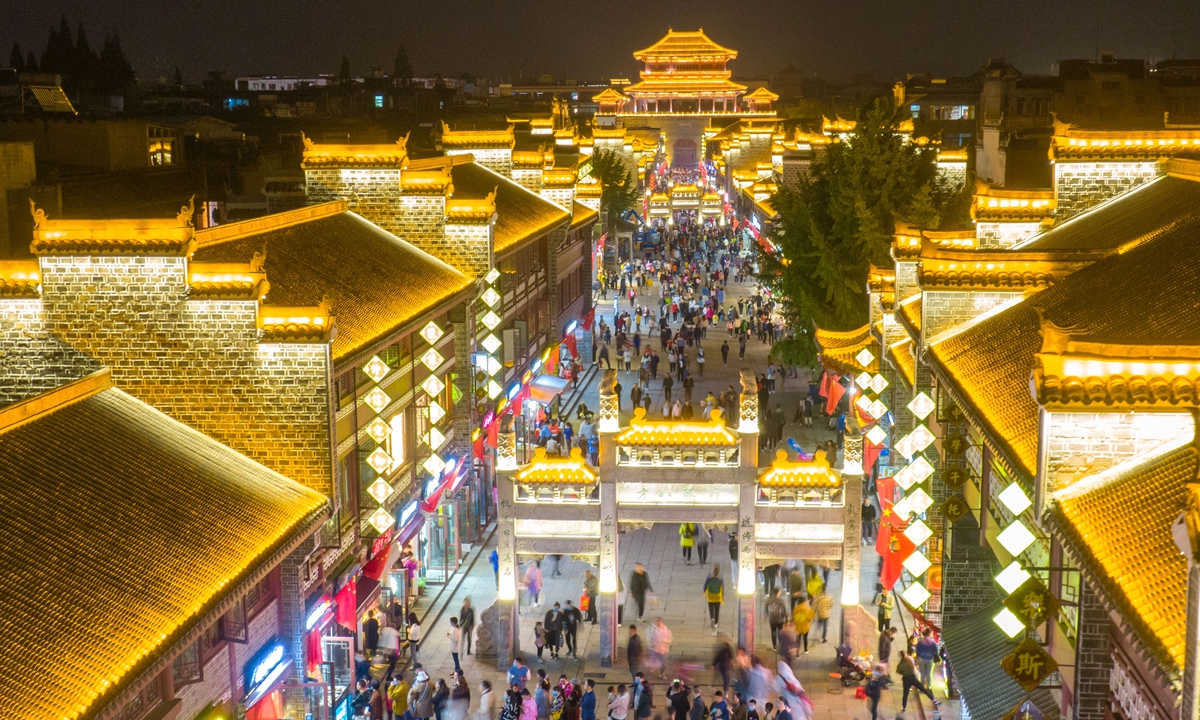China’s coronavirus response boosts stability as US suffers from denial of reality
By Robert Walker Source: Global Times Published: 2020/10/9 15:41:19

Tourists in Xiangyang, central China's Hubei Province, during National Day. Photo: VCG
Less than a year ago, the biggest news item in China was the trade war launched by the US. Before phase one of a trade agreement was signed in late 2019, the impact of trade tensions was a major topic of discussion for pundits around the world.
An opinion article in the New York Times posited that the popularity and strength of China's government were being shaken by the ongoing trade war, and that the US was sure to come out as the clear winner. There was a significant likelihood, according to the columnist, that China's loss of face in the trade war with the US would harm China's government badly, while US President Donald Trump would bask in his success.
That was written in 2019, but it might as well have been written a lifetime ago.
One year ago, conventional wisdom maintained that the US government had China on the ropes, and that China would be unable to effectively defend its interests in the face of the trade war.
Today, things are different. Very different.
In late 2019, the COVID-19 was first reported in Wuhan, China, and the Chinese government acted quickly to isolate its cases and to stamp out the new virus. The response in much of the Western world was schadenfreude - taking a certain amount of pleasure in China's distress.
Wilbur Ross, the US Secretary of Commerce, said in January that the coronavirus outbreak in China could be a boost to the US economy. "The fact is, it does give business yet another thing to consider when they go through their review of their supply chain... So I think it will help to accelerate the return of jobs to North America," he said in an interview with Fox News.
TheHill.com, an influential political website based in the US, published a column in March, "Coronavirus shows Donald Trump was right all this time about China," arguing that "it was the Chinese economy that took a hard hit, while our economy at home surged to its strongest performance in half a century."
But the initial gloating did not last long. As it became clear that China was sparing no effort to curb the outbreak, the criticism started erupting. "Blame the Chinese Communist Party for the coronavirus crisis," wrote USA Today, claiming that China purposefully hid critical information about the virus outbreak from the world.
These reactions are tragic, though predictable, and almost parallel to the five stages of grief, coined by psychiatrist Elizabeth Kubler-Ross in 1969. First comes denial: the coronavirus won't bother Western countries. When much of the Western world believed COVID-19 was an exclusively Chinese problem, anti-China voices were overjoyed. But as it became clear that viruses don't discriminate, the happiness turned to anger - the second stage of grief.
And in the United States, the soon-to-be victor in their trade war (at least, according to many Western pundits), a combination of anti-science attitudes, extreme individualism and the denial of reality has resulted in more than 7 million cases and a death toll approaching 220,000.
In China, conversely, despite quadruple the population, the cases and deaths are a tiny fraction of those figures.
But the anger continued. In April, CNN asked, "Many wonder if China's coronavirus recovery can be trusted," claiming baselessly that China's recovery simply looked too good to be true.
But the answer is far simpler. China's economy rebounded faster because it took the virus seriously, and there was widespread adherence to the law and a collective sense of responsibility.
Meanwhile, in the United States, masks have become a point of contention, with US President Donald Trump frequently mocking mask-wearing, and suggesting it's a sign of weakness.
But despite the bluster, the results speak for themselves.
Far from losing, China is winning. According to the IMF, while the US economy is projected to shrink 8 percent in 2020, China's economy is one of few in the world to grow, albeit modestly.
The benefits of taking COVID-19 seriously are more than just economic, too. Cary Wu, a professor at Toronto's York University, polled 20,000 Chinese citizens about their country's response to the virus, and found that half of respondents said they became more trusting of the Chinese government, while only 3.3 percent became less trusting.
In the US, meanwhile, polling shows a large majority of Americans disapprove of their country's handling of the crisis, and Donald Trump trails his challenger by double-digit figures.
A lot has changed in a year, but it's clear that the denial, anger and stubborn refusal of many American pundits to accept China's success in curbing the coronavirus doesn't change reality. Taking public health seriously clearly not only has economic benefits, but political benefits too.
The author is an expert in international branding strategy, who writes about China's image in the Western world. He holds a Bachelor of Journalism degree. opinion@globaltimes.com.cn
Posted in: VIEWPOINT